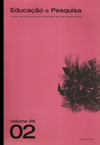Industrial businessmen and the Brazilian professional education
DOI:
https://doi.org/10.1590/S1517-97022003000200004Keywords:
Industrial businessmen, Professional education, CompetitivenessAbstract
Considering the political and economical changes that took place in the Brazilian society during the last decade of the 20th century, characterized as they were, among other facts, by the rising of the neoliberal ideology and by changes in the productive sector, apart from the professed emphasis government and business sectors have placed on the necessary reform of the education system aimed at achieving a competitive economy, the objective of this article is to investigate the role industrial businessmen assign to professional education within their projects of economic development. The primary reference material used were technical documents by the Confederação Nacional da Indústria (CNI - National Confederation of Industries) and by the Federação das Indústrias do Estado de São Paulo (Fiesp - Industry Federation of the State of São Paulo), and also testimonies from leaders of those institutions extracted from various Brazilian periodicals. The conclusion has been that although Brazilian businessmen have emphasized investments in basic and professional education, such emphasis seeks to adjust education in Brazil to economic interests and not to regard it as a social right to be guaranteed by the state to all citizens. The analyses and proposals for education made by businessmen evolve around principles similar to those put forward by the World Bank, which adhere strictly to the Theory of Human Capital. The text also shows that such proposals regarding economic development and educational policy have been incorporated into the Brazilian central government agenda during the 1990s.Downloads
Download data is not yet available.
Downloads
Published
2003-12-01
Issue
Section
Articles
License
Authors assume exclusive responsibility for the concepts expressed in their articles, which do not necessarily reflect the journal’s opinion.
Permission to photocopy all or part of the material published in the journal is granted provided that the original source of publication be assigned.
How to Cite
Industrial businessmen and the Brazilian professional education . (2003). Educação E Pesquisa, 29(2), 249-263. https://doi.org/10.1590/S1517-97022003000200004



